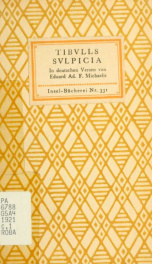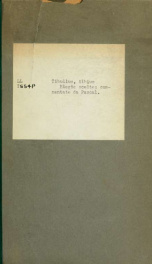Tibullus
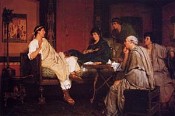
Albius Tibullus (ca. 54-19 BC) was a Latin poet and writer of elegies. Little is known about his life. His first and second books of poetry are extant; many other texts attributed to Tibullus are of questionable origins. There are only a few references to him in later writers and a short Life of doubtful authority. His praenomen is not known, nor is his birthplace and his gentile name has been questioned. His status was probably that of a Roman knight (so the Life affirms); and he had inherited a considerable estate. But, like Virgil, Horace and Propertius, he seems to have lost most of it in 41 BC amongst the confiscations of Mark Antony and Octavian. Tibullus's chief friend and patron was Marcus Valerius Messalla Corvinus, himself an orator and poet as well as a statesman and a commander. Messalla, like Gaius Maecenas, was at the centre of a literary circle in Rome. This circle had no relationship with the court, and the name of Augustus is found nowhere in the writings of Tibullus. About 30 BC Messalla was dispatched by Augustus to Gaul to quell a rising in Aquitania and restore order in the country, and Tibullus may have been in his retinue. On a later occasion, probably in 28, he would have accompanied his friend who had been sent on a mission to the East, but he fell sick and had to stay behind in Corcyra. Tibullus had no liking for war, and though his life seems to have been divided between Rome and his country estate, his own preferences were wholly for the country life. The loss of Tibullus's landed property is attested by himself (i. I, 19 seq.), "Felicis quondam, nunc pauperis agri" ("Once fruitful, now impoverished fields" ;cf. 41, 42). Its cause is only an inference, though a very probable one. That he was allowed to retain a portion of his estate with the family mansion is clear from ii. 4, 53. Tibullus may have been Messalla's contubernalis in the Aquitanian War (Vita Tib. and Tib. i. 7, 9 seq., a poem composed for Messalla's triumph), and may have received militaria dona (Vita Tib.). Tibullus died prematurely, probably in 19, and almost immediately after Virgil. His death made a deep impression in Rome, as we learn from his contemporary, Domitius Marsus, and from the elegy in which Ovid (Amores, iii. 9) enshrined the memory of his predecessor. The first book consists of poems written at various times between 30 and 26. His first love, the subject of book i., is called Delia in the poems, but we learn from Apuleius (Apol. 10) that her real name was Plania. As regards her station, it should be noticed that she was not entitled to wear the stola, the dress of Roman matrons (i. 6, 68). Her husband is mentioned as absent (i. 2, 67 seq.). She eludes the custodes placed over her (i. 2, 15 and 6, 7). Tibullus's suit was favoured by Delia's mother, of whom he speaks in very affectionate terms (i. 6, 57 seq.). For Tibullus's illness at Corcyra, see i. 3, I seq., 55 seq. The fifth elegy was written during estrangement (discidium), and the sixth after the return of the husband and during Delia's double infidelity. It is impossible to give an exact account of the intimacy. The poems which refer to her are arranged in no chronological order. Sometimes she appears as single, sometimes as married; but we hear nothing either of her marriage or of her husband's death. Yet it is clear that it was the absence of her husband on military service in Cilicia which gave Tibullus the opportunity of seeing her, and he continued to do so when the husband returned. Delia was clever in deception--too clever, as Tibullus saw when he found that he was not the only lover. His entreaties and appeals were of no avail; and after the first book we hear no more of Delia. In addition, several elegies in Book I concern themselves with Tibullus's love for a boy, who is named Marathus. About the second book we can only say that in all likelihood it was published before the poet’s death in 19. It is very short, containing only 428 verses, and apparently incomplete. In the second book the place of Delia is taken by "Nemesis", which is also a fictitious name. Nemesis (like the Cynthia of Propertius) was probably a courtesan of the higher class; and she had other admirers besides Tibullus. He complains bitterly of his bondage, and of her rapacity and hard-heartedness. In spite of all, however, she seems to have retained her hold on him until his death. Ovid, writing at the time of Tibullus's death (Am. iii. 9, 31), says: "Sic Nemesis longum, sic Delia, nomen habebunt, altera cura recens, altera primus amor." (Thus Nemesis and Delia will be long remembered: the first Tibullus' recent love, the other his first.) Nemesis is the subject of book ii. 3, 4, 6. The mention of a Una (ii. 6) settles her position. The connection had lasted a year when ii. 5 was written (see ver. 109). It is worth noticing that Martial selects Nemesis as the source of Tibullus's reputation (viii. 73, 7; cf. xiv. 193). The character of Tibullus is reflected in his poems. It seems to be an amiable one. He was a man of generous impulses and unselfish disposition, loyal to his friends to the verge of self-sacrifice (as is shown by his leaving Delia to accompany Messalla to Asia), and apparently constant to his mistresses. His tenderness towards them is enhanced by a refinement and delicacy which are rare among the ancients. When treated cruelly by his love, he does not invoke curses upon her head. Instead he goes to her little sister’s grave, hung so often with his garlands and wet with his tears, to bemoan his fate. His ideal is a quiet retirement in the country with the loved one at his side. He has no ambition and not even a poet's yearning for immortality. In an age of crude materialism and gross superstition, he was religious in the old Roman way. His clear, finished and yet unaffected style made him a great favourite and placed him, in the judgment of Quintilian, ahead of other elegiac writers. For natural grace and tenderness, for exquisiteness of feeling and expression, he stands alone. He rarely overloads his lines with Alexandrian learning. However, his range is limited. Tibullus is smoother and more musical, but liable to become monotonous; Propertius, with occasional harshnesses, is more vigorous and varied. In many of Tibullus's poems a symmetrical composition can be traced. Specimens of Tibullus at his best may be found in i. I, 3, 89-94; 5, 19-36; 9, 45-68; ii. 6. Quintilian says (Inst. x. I, 93), "Elegia quoque Graecos provocamus, cuius mihi tersus atque elegans maxime videtur auctor Tibullus; sunt qui Propertium malint; Ovidius utroque lascivior, sicut durior Gallus." ("In Elegy as well we rival the Greeks; of whom for me the author Tibullus seems the most polished and elegant; there are those who prefer Propertius; Ovid is more wanton than either, just as Gallus is more stern.") Some of the genuine poems of Tibullus have been lost. On the other hand, much of the work attributed to him is that of others. Only the first and second books can claim his authorship. In both books occur poems which give evidence of internal disorder; but scholars cannot agree upon the remedies to be applied. The third book, which contains 290 verses, is by a much inferior hand. The writer calls himself Lygdamus and the love that he sings of Neaera. He has little poetical power, and his style is meagre and jejune. He has a good many reminiscences and imitations of Tibullus, Propertius and Ovid (iii. 5, 15-20, and Ovid, Ars. am. ii. 669 seq.; Tr. iv. 10, 6: and Am. xi. 14, 23 seq.); and they are not always happy. We do not know when his poems were added to the genuine poems of Tibullus. The separation of the fourth book from the third has no ancient authority. It dates from the revival of letters, and is due to the Italian scholars of the 15th century. The fourth book consists of poems of very different quality. The first is a composition in 211 hexameters on the achievements of Messalla, and is very poor. The author is unknown; but he was certainly not Tibullus. The poem itself was written in 31, the year of Messalla's consulship. The next eleven poems relate to the loves of Sulpicia and Cerinthus. Sulpicia was a Roman lady of high station and, according to Moritz Haupt's conjecture, the daughter of Valeria, Messalla's sister. The Sulpicia elegies divide into two groups. The first comprises iv. 2-6, containing ninety-four lines, in which the theme of the attachment is worked up into five graceful poems. The second, iv. 8-12, consists of Sulpicia's own letters. They are very short, only forty lines in all; but they have a unique interest as being the only love poems by a Roman woman that have survived. Their frank and passionate outpourings remind us of Catullus. The style and metrical handling betray a novice in poetical writing. The thirteenth poem (twenty-four lines) claims to be by Tibullus; but it is hardly more than a cento from Tibullus and Propertius. The fourteenth is a little epigram of four lines with nothing to determine its authorship. Last of all comes the epigram or fragment of Domitius Marsus already referred to. Some scholars attribute iii. 8-12 - iv. 2-6 to Tibullus himself; but the style is different, and it is best to answer the question, as Biihrens does, with a non liquet. The direct ascription of iii. 19 - iv. 13 (verse 13, "nunc licet e caelo mittatur amica Tibullo" - "Now grant that a lover be sent from heaven to Tibullus") to Tibullus probably led to its inclusion in the collection and later on to the addition of the third book to the two genuine ones. For the evidence against the ascription, see Postgate, Selections, app. C. To sum up: the third and fourth books appear in the oldest tradition as a single book, and they comprise pieces by different authors in different styles, none of which can be assigned to Tibullus with any certainty. The natural conclusion is that a collection of scattered compositions, relating to Messalla and the members of his circle, was added as an appendix to the genuine relics of Tibullus. When this "Messalla collection" was made cannot be exactly determined; but it was definitely not till after the death of Tibullus, 19 BC, and perhaps as late as the late 1st century AD. Besides the foregoing, two pieces in the collection called Priapea (one an epigram and the other a longer piece in iambics) have been attributed to Tibullus; but there is little external and no internal evidence of his authorship (see Hiller in Hermes, xviii. 343 - 349).
do you like this author?
What readers are saying
What do you think? Write your own comment on this book!
write a commentWhat readers are saying
What do you think? Write your own comment on this author!
write a commentBook list

The poems of Catullus and Tibullus, and the Vigil of Venus; a literal prose translation with notes by Walter K. Kelly, to which are added the metrical versions of Lamb and Grainger and a selection of versions by other writers
Series:
Unknown
Year:
Unknown
Raiting:
3/5
26
Show more
add to favoritesadd In favorites

Selections from Tibullus and Propertius, with introd. and notes by George Gilbert Ramsay
Series:
Unknown
Year:
Unknown
Raiting:
4.5/5
26
Show more
add to favoritesadd In favorites
Book list

The poems of Catullus and Tibullus, and the Vigil of Venus; a literal prose translation with notes by Walter K. Kelly, to which are added the metrical versions of Lamb and Grainger and a selection of versions by other writers
Series:
Unknown
Year:
Unknown
Raiting:
3/5
26
Show more
add to favoritesadd In favorites

Selections from Tibullus and Propertius, with introd. and notes by George Gilbert Ramsay
Series:
Unknown
Year:
Unknown
Raiting:
4.5/5
26
Show more
add to favoritesadd In favorites
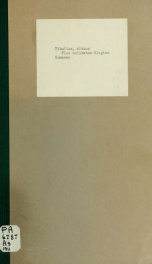
Flos delibatus Elegiae Romanae. Tibulli versiculos venustissimos elegit recognovit annotatiunculis instruxit et praemissa de Tibullo poeta disputatione adiectisque aliorum carminibus ad Tibullum pertinentibus illustravit J.J. Hartman
Series:
Unknown
Year:
Unknown
Raiting:
3/5
26
Show more
add to favoritesadd In favorites

Opera omnia ex editione I.G. Huschkii cum notis et interpretatione in usum Delphini, variis ...
Series:
Unknown
Year:
Unknown
Raiting:
4.5/5
Book digitized by Google from the library of Harvard University and uploaded to the Internet Archive by user tpb.
Show more
add to favoritesadd In favorites
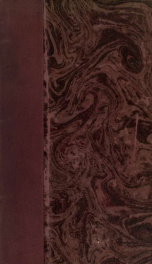
Tibulle et les auteurs du Corpus Tibullianum;
Series:
Unknown
Year:
Unknown
Raiting:
4/5
26
Show more
add to favoritesadd In favorites

Carmina; ex recensione Car. Lachmanni passim mutata 1
Series:
Unknown
Year:
Unknown
Raiting:
4/5
Pt. 1. Disquisitiones de vita et poesi Tibulli; Carmina; Accedunt lectiones editionis Pinellianae nunc primum collatae; Supplementum collationis editionis minoris a. MCCCCLXXII.- Pt. 2. Commentarium continens 26
Show more
add to favoritesadd In favorites
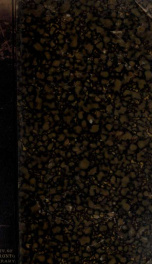
Die Elegien des Albius Tibullus und einiger Zeitgenossen;
Series:
Unknown
Year:
Unknown
Raiting:
3/5
26
Show more
add to favoritesadd In favorites
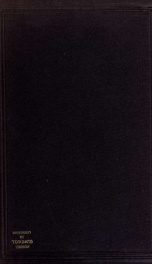
Carmina, accedunt Sulpiciae elegidia;
Series:
Unknown
Year:
Unknown
Raiting:
5/5
(Editiones criticae scriptorum Graecorum et Romanorum a Collegio philologico classico Academiae litterarum Hungaricae publici iuris factae) 26
Show more
add to favoritesadd In favorites

Elegiae, cum carminibus pseudotibullianis;
Series:
Unknown
Year:
Unknown
Raiting:
4.5/5
26
Show more
add to favoritesadd In favorites
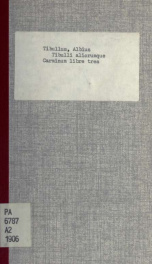
Tibulli aliorumque Carminum libre tres; recognovit brevique adnotatione critica instruxit Johannes Percival Postgate
Series:
Unknown
Year:
Unknown
Raiting:
3.5/5
26
Show more
add to favoritesadd In favorites

Carmina Tibulli duorum, el. nimirum 5-10. lib. 1. versio metrica
Series:
Unknown
Year:
Unknown
Raiting:
4.5/5
Book digitized by Google from the library of the University of Michigan and uploaded to the Internet Archive by user tpb.
Show more
add to favoritesadd In favorites

Albii Tibvlli...
Series:
Unknown
Year:
Unknown
Raiting:
4/5
Book digitized by Google from the library of the University of Michigan and uploaded to the Internet Archive by user tpb.
Show more
add to favoritesadd In favorites

Carmina textu ad codd. MSS. et editiones recognito insigniori lectionis varietate notis adjectis ...
Series:
Unknown
Year:
Unknown
Raiting:
3/5
Book digitized by Google from the library of Harvard University and uploaded to the Internet Archive by user tpb.
Show more
add to favoritesadd In favorites

Elegies
Series:
Unknown
Year:
Unknown
Raiting:
3.5/5
Book digitized by Google from the library of Harvard University and uploaded to the Internet Archive by user tpb.
Show more
add to favoritesadd In favorites

Elegiarum libri duo: Accedunt pseudotibulliana
Series:
Unknown
Year:
Unknown
Raiting:
4.5/5
Book digitized by Google from the library of Harvard University and uploaded to the Internet Archive by user tpb.
Show more
add to favoritesadd In favorites
What readers are saying
What do you think? Write your own comment on this author!
write a commentif you like Tibullus try:
readers also enjoyed
What readers are saying
What do you think? Write your own comment on this author!
write a commentGenre
if you like Tibullus try:
Do you want to read a book that interests you? It’s EASY!
Create an account and send a request for reading to other users on the Webpage of the book!
